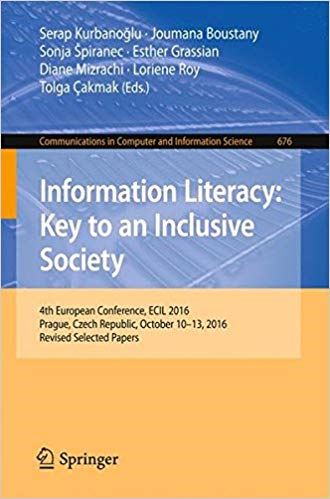Publication Details
| OLOR Series: | ROLE Reviews |
| Author(s): | Joshua Welsh |
| Original Publication Date: | 15 March 2019 |
| Permalink: |
<gsole.org/olor/rolereviews/2019vol2no1.rev3> |
Publication Note
This review was originally published in Research in Online Literacy, vol. 2, no. 1 (2019).
Resource Overview
Media, Figures, Tables |
Resource Contents
Review of Information Literacy: Key to an Inclusive Society
Information Literacy: Key to an Inclusive Society offers the conference proceedings from the 4th European Conference on Information Literacy. It contains 72 individual chapters covering a wide range of topics. Overall, the individual contributions are well-argued and thoroughly researched. Research tends to be qualitative in nature, and methodology tends to be well thought out, justified, and transparent.
The collection is divided into 13 sections, which focus on topics such as “Inclusive Society and Democracy,” “Employability and Workplace,” “Various Literacies,” “Reading Preference: Print vs Electronic,” and “Discipline Based Studies,” to name just a few.
While it is difficult to summarize even the individual sections, let alone the entire collection, individual samples provide a reasonable representation of the overall direction of the book. For example, "The Searching Circle: Library Instruction for Tribal College Students" by Roy, Orr, and Gienger provides a very helpful overview of the searching circle concept, which is "a culturally based information seeking behavior model that overlays indigenous life skills with seeking information in any format for any purpose, especially to serve academic needs" (p. 23). The Searching Circle as a learning methodology is "qualitative and multidimensional, building on formal publications and lived experiences" (p. 23). The authors then report on the creation of instructional videos that use the Searching Circle methodology to various library skills to college tribal students and provide guidelines for others that are interested in using this methodology and modality in the future.
Another chapter from the Inclusive Society and Democracy section is "Re-framing Information Literacy for Social Justice" by Laura Saunders. Saunders's article asks a question of crucial importance to anyone interested in the relationships among technology, literacy, and democracy: Should we simply train our students for jobs or should we work to develop citizens to able to fully contribute to democratic society? Whereas some Library Science scholars have argued against integrating social justice into the Associations of College & Research Libraries' Framework for information literacy for higher education on the basis that social justice is not "transformative" and therefore not a threshold concept for information literacy skills, Saunders points to the writings of Paolo Freire, Henry Giroux, and John Dewey to argue in favor of integrating social justice into this curriculum. Saunders then proposes a new frame for the information literacy in higher education framework that does include social justice, which would make it possible to integrate ideas such as power and authority as key information literacy concepts.
Another interesting chapter comes from Diane Mizrachi et al. who contributed "The Academic Reading Format International Study (ARFIS): Investigating Students Around the World." This chapter follows up on earlier research by the lead author which found that students at UCLA "if given a choice, preferred academic texts in print rather than online" (p. 217). In the current chapter, the authors conducted a survey of 9,279 participants coming from 19 countries to determine how reading format preferences vary across cultures. While the results do show some variance in terms of device use and format preference, the overall conclusion is compelling, showing that "print format is more conducive for focusing and remembering material, and students across the globe are more likely to engage in their print material through highlighting, noting and reviewing" (p. 226).
While these examples provide just the smallest taste of what is to be found in this collection, they demonstrate some of the common traits of the collection as a whole: The chapters in this collection provide examples and evidence to support a wide range of research about information literacy. While some of the chapters may seem extraordinarily tightly focused on a particular population segment in a particular country, I believe that this focus is one of the strengths of the collection.
The only weakness of the collection, in my view, is that the individual pieces are difficult to tie together and contextualize. As such, the collection is as much overwhelming as it is enriching. This could have been solved by an introductory essay that contextualizes the contributions and makes them accessible to interested scholars from other fields. Similarly, the individual sections would have benefited from brief essays to make the reader aware of the ongoing scholarly discussions that inform each grouping of chapters. Nevertheless, the book provides a wealth of research and information that can be of service to anyone working on a major project involving information literacies and how those literacies can affect inclusive societies.
Information Literacy: Key to an Inclusive Society
4th European Conference, ECIL 2016, Prague, Czech Republic, October 10-13, 2016, Revised Selected Papers, 1st Ed.
Serap Kurbanoğlu, Joumana Boustany , Sonja Špiranec, Esther Grassian, Diane Mizrachi, Loriene Roy, & Tolga Çakmak, (Eds.). (2017). Springer. [ISBN: 978-3-319-52162-6, 742 pages, US$139.99 (softcover).]
About the Reviewer
Joshua Welsh is an assistant professor in the English Department at Central Washington University. His research involves rhetoric and technology, with special interests in online technical writing pedagogy, intellectual property, open-source software, and mobile computing. He holds an MS (2009) and a PhD (2013) from the University of Minnesota



